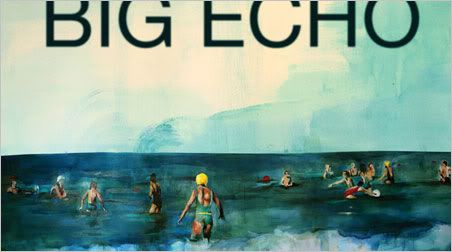
“Excuses”
from the album Big Echo
2010
iTunes
Big Echo is Berkeley, California quartet The Morning Benders‘ second full-length, following a string of EPs and a debut album, Talking Through Tin Cans, which, despite being voted iTunes’ “Alternative” album of 2008, managed to go about its business unnoticed by all but the keenest critics. This follow-up builds on the acoustic pop of the debut with co-production from Chris Taylor of Grizzly Bear, who took the band out on tour last fall, and that fact alone will gain the Morning Benders more publicity than they’ve had collectively over the last five years. The Grizzly Bear connection is also bound to figure heavily in every review of this album, as Big Echo unavoidably shares the older band’s distinctive production sound; however, the songs here are sweeter, the melodies catchier. It’s like Veckatimest with extra sugar.
The record kicks off with the waltz-time wall-of-sound “Excuses,” an ambitious opener taking in sweeping orchestration and Beach Boys harmonies, and the band’s maturation is evident from the off. More stately, more grandiose than anything on their debut, it retains that album’s knack for a strong, memorable tune and adds ribbons and bows. It’s not just the music that has matured though, with vocalist Chris Chu taking his “tongue to the Southern tip” of a lover’s body – slightly disconcerting after seeing the track’s immensely popular viral video and realising I have underwear older than the singer. Childhood innocence continues to fade with “Promises,” musically a close relative of Grizzly Bear’s “Two Weeks” with it’s stuttering drums, bass-heavy riff and twinkling pianos. “I can’t help thinking we grew up too fast,” sings Chu, “And I know that this won’t last a second longer than it has to.” Lyrically, it’s an older, wiser take on the debut’s bittersweet love songs; musically, it’s a leap forward on par with Coldplay’s evolution between their first and second albums.
Whilst only “Cold War” and “All Day Day Light” echo the carefree swing of Tin Cans tracks like “Loose Change,” Big Echo is by no means a downbeat album. Taylor’s “trademark” sound – making the guitars and drums sound like they were recorded in a cavernous concert hall whilst simultaneously catching every rim-tap and string scrape, barely-there ambient electrical noise, and the occasional orchestral flourish – ensures that, in general, the songs echo Grizzly Bear’s chamber-pop, but the overall tone is an altogether different matter. Whereas Yellow House and Veckatimest impressed with the complexity of their musical arrangements, the majority of tracks failed to connect in any emotional capacity. Here, songs like “Pleasure Sighs,” “Stitches” and the closing “Sleeping In” share the Grizzlys’ fondness for recreating lush Disneyfied soundscapes with simmering builds and shimmering crescendos, but there is a warmth in Chu’s voice and tenderness in his lyrics that is seldom found in the older band’s work. Only “Mason Jar,” with it’s slightly clumsy, mournful lyrics, feels in any way forced or overdramatic. Elsewhere, the band explores further new territory, and find much to love. The dreamy “Wet Cement” has a soulful bounce which should appeal to fans of Beach House’s lazy vibes, the aforementioned “Cold War” has a breezy calypso feel, and several tracks, most noticeably “Hand Me Downs,” display a subtle undercurrent of the elegant post-rock favoured by the likes of Explosions In The Sky.
Big Echo is a remarkable achievement of an album, full of beautiful, memorable songs whose sheer class belie their creators’ youthful inexperience. Whether the band would have arrived at this point without the assistance of Chris Taylor is debatable, but ultimately irrelevant; producers from George Martin to Eno through to Dave Fridmann and Jim O’Rourke have proved that great albums often owe as much to what is added afterwards as to what the band actually plays. The quality of the songwriting is undeniable though, and with the addition of this new set, the Morning Benders already have a catalogue of songs to rival much more established bands.


